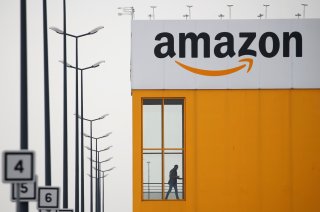Gold Rush, Coronavirus Style: COVID-19 Giving Online Retailers Massive Sales Boost
Is retail RIP now?
As millions of Americans are sheltering in place or deciding to self-quarantine because of the novel coronavirus, there will certainly be one big winner in this health crisis: e-commerce.
For the foreseeable, gone are those door-busting deals where crowds gather in front of entrances to get into stores first. Now, millions are using their mouse and touchpads to click on sales items for purchase.
The fear factor of physically shopping in brick-and-mortar stores has indeed shifted more sales to online platforms. Online digital sales are heavily weighted toward certain categories, and according to Forbes, it’s 42.7 percent for electronics, 28.9 percent for apparels and 3.2 percent for food and beverage.
No question that restaurants are suffering and this current pandemic will surely drive more people to utilize online platforms to buy grocery items (and drive up that 3.2 percent) and have them delivered, a service that has only begun to take off in the past couple of years.
The Wall Street Journal reported: “The (restaurant) sector could suffer a 20 percent drop in sales in the three months through April across the country.”
This will be a boon for this burgeoning service, as customers, if all goes well, will be more likely to make future purchases in the same manner.
This pandemic could change the landscape of online retailers as well. The online retail giant Amazon is ready to pounce on new customers and take even more market share, as cash-strapped smaller players will no longer be economically viable and go out of business amid the uncertain economy.
Many -- even those finicky shoppers who have to physically touch a cucumber before buying it -- will surely feel that signing up for AmazonFresh will be a necessary service to get groceries safely and hassle-free in the future.
Even Target, in a recent investor conference call, discussed how its same-day delivery service has changed shoppers’ behaviors, spurring higher spending and increased customer loyalty.
One major problem online retailers is confronted with is sourcing supplies. With extensive factory closings in China and other manufacturing centers around the world, online retailers will eventually fail to meet heightened demand if the factory doors remain shuttered.
In 2020, e-commerce is slated to represent 12 percent of total retail sales. It will indeed be interesting to see how high this figure will get when the current quarter gets reported.
Ethen Kim Lieser is a Tech Editor who has held posts at Google, The Korea Herald, Lincoln Journal Star, AsianWeek and Arirang TV.
Image: The logo of Amazon is seen at the company logistics center in Lauwin-Planque, northern France, March 19, 2020. Several hundred employees protested in France, calling on the U.S. e-commerce giant to halt operations or make it easier for employees to stay away during the coronavirus (COVID-19) epidemic. REUTERS/Pascal Rossignol

